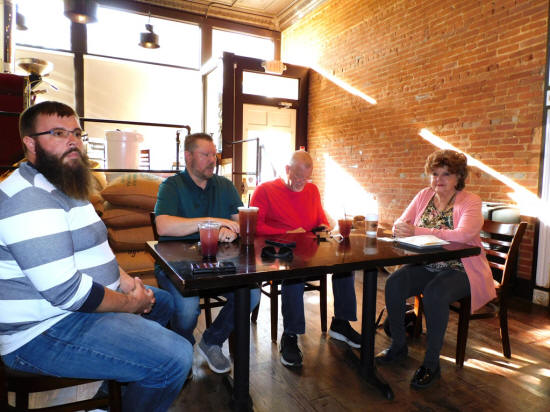|
Coffee with the Mayor
Part One - Welch fields questions about
Logan Correctional and his personal goals for Lincoln
 Send a link to a friend
Send a link to a friend
[April 05, 2024]
 On
Saturday, March 30th, Lincoln Mayor Tracy Welch hosted Coffee with
the Mayor at Guest House Coffee and Pastries. Joining the mayor were
Ward 3 alderpersons Kevin Bateman and Wanda Lee Rohlfs and Lincoln
Waste Treatment Manager Andrew Bowns. On
Saturday, March 30th, Lincoln Mayor Tracy Welch hosted Coffee with
the Mayor at Guest House Coffee and Pastries. Joining the mayor were
Ward 3 alderpersons Kevin Bateman and Wanda Lee Rohlfs and Lincoln
Waste Treatment Manager Andrew Bowns.
This month there were several in attendance to talk to the mayor
about topics that were prevalent on their minds in regard to the
city of Lincoln.
Welch began by introducing Bateman and Rohlfs. He introduced Bowns,
noting that he had driven from his residence in Litchfield to be at
the 9 a.m. meeting. Later in the meeting it was also mentioned that
Bowns in originally from Lincoln. He is the grandson of Judy Busby
and the late Buzz Busby who served for many years on the city
council, and the son of Cince Bowns and the late Jerry Bowns of
Lincoln.
The waste treatment plant is owned by the city of Lincoln, and its
management is contracted to Veolia Water. Bowns is employed by
Veolia.

Welch began by saying that the purpose of the
bi-monthly coffee with the mayor meetings was to provide
constituents with an opportunity to ask questions and offer opinions
on matters involving the city. He said the floor was open to the
guests for whatever topic they wished to explore.
The first topic of the day was the situation at Logan County
Correctional (the women’s prison just south of Lincoln). Welch
delivered a blow-by-blow on the events that led to the public
announcement from Governor JB Pritsker’s office.
He said that his office had received notice from the governor’s
office asking for a meeting with Welch and Logan County Board Chair
Emily Davenport and others. Welch and Davenport contacted Senator
Sally Turner’s office and she was unaware of the request. Turner and
Representative Bill Hauter contacted the governor’s office and asked
to be included in the meeting. They were granted a meeting, but it
was held separately.
What it boils down to is that the state has decided to invest $900
million in “upgrading” two Illinois prisons. The official press
release issued by the governor’s office said that the prison in
Stateville would be torn down and a brand-new facility built on the
same site.
However, the comments pertaining to Logan were quite vague, and
concerning, “The status of Logan in the interim is still to be
worked through with various stakeholders, and the location of the
new facility is still being finalized.”

Welch said that the Illinois Commission on Government
Forecasting and Accountability (CoGFA) will be sent to evaluate the
Logan facility and will make a recommendation to the governor’s
office on how to proceed.
Welch said that Turner and Hauter have a meeting scheduled with the
Deputy Governor. That office oversees Public Safety, Infrastructure,
Environment, and Energy in Illinois. Welch and Davenport have not
been invited to join that meeting.
Welch noted that the press release said that Logan employs 452
people. He said that it has been stated that those employees will be
offered work in other locations.
Andrea Runge with the Lincoln Economic Advancement and Development
has contacted the University of Illinois to do an impact study on
the loss of the prison if it is not rebuilt in Logan County. It was
mentioned from the constituents that it is noteworthy that Logan
County is traditionally a Republic voting county while the state
overall is Democrat voting and the current governor is Democrat.
[to top of second column] |


Welch said that no decisions have been made public at
least concerning the future of the prison, but he feels that the
city and county are responsible for continuing to push for the
retention of the prison in the county. He said that he would
continue to pursue this because “My fear is that they will forget
about us if we let off the gas.”
It was mentioned that the two prisons, Lincoln and
Logan, are connected to the city via the sewer system. The prisons
are on city sewers, and Bowns said that Logan constitutes about 8
percent of the total revenue posted to the sewer fund. Bateman noted
that the state is historically slow in paying, but they do pay. If
that revenue is lost, it will have an impact on the sewer fund.
Other thoughts on the topic included a question as to why the state
has estimated that it costs almost twice as much per prisoner to
house a female inmate over a female. There was also talk of could
the state owned land at the former Lincoln Developmental Center be a
viable option for a new prison. Welch said if that were a
possibility it would take a lot of public education and careful
consideration for the residents who live in that area.
It was also suggested that there could be community awareness
rallies to show support for the prison remaining in Logan County.
Moving on to another topic, Welch was asked what his personal and
political goals are. He said that his goal is to see this community
thrive and grow. He said he wants to grow the population and he
wants to be one who will always listen to the people of the city. He
said that he wants Lincoln to be a place where people say “I love it
here, I want to live here.”

He said his office spends a lot of time “putting out
fires.” And he said sometimes it is the focusing on the little
things that make a big difference. He said he was recently contacted
by a professional photographer who wanted to know why photographers
have to pay an annual registration fee with the city while other
businesses don’t. It was a good question. He said the end result,
the licenses for professional photographers has been suspended for
this year, while city governance looks into the question more
thoroughly.
Welch said there are always big ongoing issues, such as the city
sewer system. The system in most parts of the town are antiquated.
He spoke about an issue on Campus View Drive that is going to have
to be addressed by the city. He said the houses on Campus View were
originally built on Lincoln Christian College property. The sewer
lines were run with no consideration for future development and as a
result sewer lines are running under houses and other structures,
making them difficult to address. He said he believes something
needs to be done to help those people and that will be a challenge.
The Saturday morning coffee with the mayor lasted nearly two hours,
with the second part of the event addressing questions about the
Lincoln Police Department, the city sewer system, and other topics.
That portion of the discussion will be covered in
part two of Coffee with the Mayor.
[Nila Smith]
 |